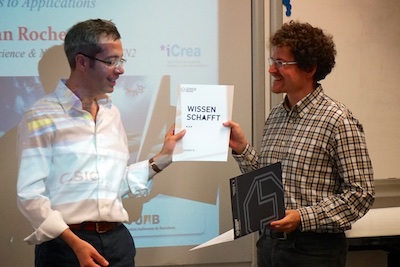Dr. Pecchia is visiting us from September 25 to November 14, 2014 in the framework of the Dresden Fellowship Programm
laudatio:
Dr. Alessandro Pecchia received his PhD in Electronics Engineering, with honors, from the University of Leeds and was awarded the F.W. Carter prize as 'best PhD thesis of 2002'. He moved to the University of Rome 'Tor Vergata' for a first PostDoc, after which he won a long tenure contract of five years within INFM institute (CNR-INFM since 2005). In February 2009 he got a permanent position in CNR-INFM and in September 2010 he moved to the CNR institute for studies of nanoscale materials (ISMN). Since his PhD, his main research focuses on multidisciplinary fields studying organic and inorganic interactions and quantum transport in nanoscale devices and molecular electronics, as well as opto-electronic properties of quantum-dots and nanowires. Since 2003 he has been developing the general purpose tool 'gDFTB' for transport in nano and molecular systems, based on an atomistic tight-binding description and non-equilibrium Green's function methods. The method has been applied to compute device characteristics of CNT-FETs and SiNW FETs and more recently graphene and MoS transistors. The principal current activity of research is on molecular transport, including electron-phonon scattering and thermal dissipation models. Since 2008 he has been strongly involved in the development of TiberCAD, an atomistic/FEM multiscale simulation tool for transport in opto-electronic devices and hybrid organic-inorganic devices, developed in collaboration with the group of Prof. Aldo Di Carlo at University of 'Tor Vergata'.

